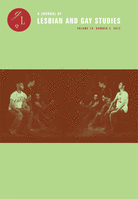(Sent by Mehita I.)
Call for Papers:
“All Hail the Queenz: A Queer Feminist Recalibration of Hip Hop Scholarship”
A Special Issue of Women and Performance: A Journal of Feminist Theory.
Issue Guest Editors: Shanté Paradigm Smalls (University of New Mexico) and Jessica N. Pabón (New York University)
Submission deadline: May 1, 2013
Women and Performance invites submissions for a special issue, “All Hail the Queenz: A Queer Feminist Recalibration of Hip Hop Scholarship.” The editors welcome scholarly articles and performative texts that foreground feminist and queer performance studies approaches to hip hop culture, consumption, and production.
Contemporary rap music, as a stand-in for hip hop culture and production, is virtually synonymous with misogyny and homophobia in the mainstream US and academic imaginary. We want to explore the range of understandings and theories that inform how women and queers experience hip hop culture and performance; this issue underscores the multiplicity of hip hop culture and rejects a myopic totalizing view of what “the culture” does and is. We seek to engage with the wide range of hip hop scholars and practitioners working at the intersections of various methodologies not always associated with scholarly considerations of hip hop (including psychoanalysis, feminist and queer theory, and performance theory), as well as methods typical to hip hop studies—sociology, Black studies, literature, history, musicology, and urban studies. An emerging class of hip hop scholars pressure the givens of race, gender, performance, sexuality, region, nationality, artistry, and iconography—as a culture that has been in a state of constant development for the past forty years, hip hop scholarship is more than due for a queer feminist remixing and reimagining.
As coeditors, we challenge the readers of Women & Performance to ask:
What would a specifically queer feminist performance studies approach to hip hop’s culture and production generate in terms of scholarship? How does a queer feminist experience and critique revise hip hop studies?
Why has performance studies had so little to say about hip hop, what interventions does performance studies yield? The issue’s focus on producing knowledge about hip hop culture that centralizes women, girls and queer people will include a range of elements, both popular and
subcultural: DJ culture, dance, graffiti, human beat boxing, rap music, as well as fashion, media and print, organizing, and other forms of knowledge production. No matter the genre, hip hop is often conceived and misrepresented as a male-dominated culture which casts women and girls as an addendum to hip hop rather than as primary producers, critics, and consumers. Within the pages of this issue, contributors revisit the centrality of feminist and queer artists to the production of all elements of hip hop culture and of feminist and queer critique to hip hop scholarship. “All Hail the Queenz” intends to tease out the nuanced negotiations women, girls, and queer people develop as hip hop artists, critics, and consumers participating within this climate.
Through re-centering feminist and queer critiques and female and queer performance, “All Hail the Queenz” recalibrates hip hop’s center. By recalibrating the center, contributors to this issue refashion hip hop historiography and hip hop aesthetics beyond the art of rapping by the cisgendered male body. In a kind of textual reperformance, this issue takes its title from Queen Latifah’s lyrical demands for respect on her first womanist rap classic album, “All Hail the Queen,” and reminds readers once again that “stereotypes, they got to go!”
Potential Topics:
* Alternate Hip Hop historiographies
* Artist Scholars
* DJing, technology, gender, sexuality
* Feminist, queer, trans* aesthetics
* Feminist, queer, trans* pedagogy
* Graffiti and gender/sexuality
* Hip Hop culture and dis/ability
* Hip Hop diasporas
* Hip Hop fashion
* Hip Hop feminism
* Hip Hop festivals
* Hip Hop’s hybridity
* Human Beatboxing
* Media culture and social networking
* Nation, Empire, and hip hop
* Queer feminist hip hop critique
* Queerness and/in/of hip hop
* Trans* in/and hip hop
Article submissions should be 6-8,000 words in length and adhere to the current Chicago Manual of Style (CMS), author-date format. Performative texts should be 2-3,000 words and in any style the author chooses (same CMS style as above if using citations). Photo essays are welcome.
Questions and abstracts for review are welcome before the final deadline.
Complete essays and texts for consideration must be submitted by 11:59 PM EST, May 1, 2013.
Please send all work to both Shanté Paradigm Smalls and Jessica N. Pabón via email (MSWord attachment): shantesmalls@gmail.comand jnp250@nyu.edu.
Further submission guidelines may be found at:
www.womenandperformance.org/submission.html. Women and Performance is a peer reviewed journal published by Routledge, Taylor & Francis.
